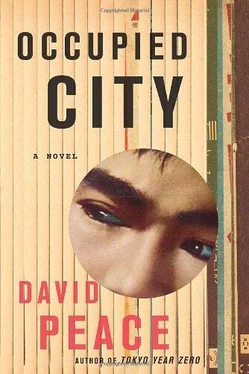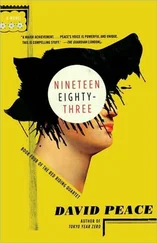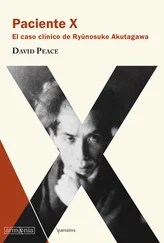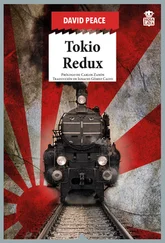[VARIOUS PAGES DAMAGED, DEFACED, OR MISSING FOR REASONS UNKNOWN]
The Second Period (the second twenty days of the investigation; 15 February to 5 March, 1948) —
1948/2/15; 06.00:Cloudy, then overcast / The second floor of Mejiro Police Station / Special Investigation HQ / Meeting of the Special Investigation Team / Chief of Police Kita present / Overview of Investigation to date / Over 500 suspects questioned / Innumerable leads followed up / All suspects eliminated and released / All leads investigated and exhausted / Back to ji-dōri / Back to meetings / Endless ji-dōri , endless meetings / Endless wastes of time / Endlessly taking us nowhere.
[VARIOUS PAGES DAMAGED, DEFACED, OR MISSING FOR REASONS UNKNOWN]
1948/2/23; 18.00:Cold / Meeting of entire First Investigative Division at Special Investigation HQ / SCAP-Justice Ministry Liaison Officer Miyakawa reports on results of meeting with Public Safety Division of Supreme Commander for the Allied Powers on 19 February 1948 / On behalf of the Investigation, Miyakawa requested the assistance of the SCAP Public Safety Division in locating a Lieutenant Hornet and a Lieutenant Parker / Both names associated with typhus disinfecting teams in the Tokyo area / Lieutenant Hornet believed to have been associated with the Toshima team in the Ōji and Katsushika Wards / Lieutenant Parker associated with the Ebara disinfecting team / Witnesses at the Ebara branch of the Yasuda Bank reported suspect as saying, ‘I came here with Lieutenant Parker in a jeep because a new typhus case happened in the vicinity.’ / At the Shiinamachi branch of the Teikoku Bank, the same individual is reported as saying, ‘I came here because there have been many dysentery cases in the area. Lieutenant Hornet will be here soon.’ / Miyakawa requested that the Public Safety Division of SCAP provide any information, names and addresses of Japanese individuals either connected with or having knowledge of the disinfecting work done by either of the above lieutenants, particularly interpreters or individuals who speak English / Miyakawa advised elimination of individuals below the age of thirty or above the age of sixty / Mr Eaton of the Public Safety Division informed Miyakawa that, having spoken with Mr Allen of the Tokyo MG Team Sanitation Control, ten low-ranking medical officers were used by the MG Team in typhus epidemic control activities in 1946 / However, at present, there are no military personnel employed by the MG Team in such work / All disinfecting work is now carried out by Japanese employees of the Tokyo Ward Offices / Furthermore, no such teams are employed by the Public Health & Welfare Department / Mr Eaton stated that some SCAP personnel are presently used in rodent control under HQ and Service Group, Repair and Utilities Division, but none by the name of Parker or Hornet / Finally, Mr Eaton stated that he would contact the AG Section of GHQ to ascertain the names and whereabouts of any lieutenants or captains by the name of Parker or Hornet who have been assigned to Japan / Meeting ends / Back to ji-dōri / Back to meetings / Ji-dōri and meetings / Endless, endless ji-dōri and endless, endless meetings / Endless, endless wastes of time / Endlessly, endlessly taking us nowhere.
[VARIOUS PAGES DAMAGED, DEFACED, OR MISSING FOR REASONS UNKNOWN]
1948/3/4; 18.00:Meeting of entire First Investigative Division at Special Investigation HQ / Police Chief Kita has requested that the Public Safety Division of SCAP assist in securing any information available pertaining to a group of former Japanese military personnel who were sent to Korea as poisoners during the war / It is believed that these persons were highly trained in preparation of various poisons / It is also believed that SCAP is investigating these persons for possible war crimes / Meeting ends / Nothing now but more ji-dōri , more meetings / More ji-dōri , more meetings / More, more ji-dōri , and more, more meetings / More, more wastes of time / More, more, taking us nowhere.
[VARIOUS PAGES DAMAGED, DEFACED, OR MISSING FOR REASONS UNKNOWN]
The Third Period (the third twenty days of the investigation; 6 March to 25 March, 1948) —
1948/3/6; 06.00:Strong northeasterly winds / Meeting of entire First Investigative Division at Special Investigation HQ / Police Chief Kita gives overview of investigation to date and outlines direction of investigation for Third Period / Focus to be on new lead checking ex-personnel of the former Japanese Imperial Chemical Laboratory in Tsudanuma, Chiba-ken / Known that experiments were conducted with prussic acid as a poison / Corps sent to Manchuria during the war / Corps used poison on animals and humans successfully / Pamphlet on use of poison issued to Japanese army personnel / Modus operandi and use of prussic poison by the criminal very similar to the training developed by Tsudanuma Arsenal / Language used by the criminal indicative of training by this laboratory / Further evidence: use of ‘First Drug’ and ‘Second Drug’ in English; ability to drink from the same bottle as victims in knowledge that poison had been precipitated at bottom of solution; knowledge of precipitation of prussic acid using oil from palm trees / Furthermore, equipment used matches description of equipment used in Tsudanuma laboratory / Note: at end of war and closure of laboratory, employees took equipment home / Personnel information on former employees now been given by former Major Nonoyama and former Colonel Yokoyama / Request that all information be kept secret for fear of prosecution by War Crimes Tribunal / Police Chief Kita concludes meeting with statement that complaint about behaviour of press will be lodged with SCAP / Cheers / Meeting ends / 08.00: Meeting of Room #2 for re-assignment / Retained with Fukushi on ji-dōri team / Argument with Suzuki (Head of the First Division) / Questioning is ineffective / Leading nowhere / Three crime scenes — Ebara, Nakai and Shiinamachi — not helping / Suggest only follow hard evidence of Matsui and Yamaguchi name-cards / Track the cards, find the killer / Rebuked for insubordination / Transferred and demoted to Robbery Room with Fukushi / 09.00: Report for reassignment to Robbery Room / Small rented room next to Investigation HQ in Mejiro / Now under Inspector Iki-i / Eight men; four on Matsui, four on Yamaguchi / Assigned to Matsui card with Fukushi / All reports direct to Iki-i / Iki-i reports directly to Police Chief Kita / No information to be given to First Investigative Division (for fear of leaks to press) / Told to read through Robbery Room name-card files and notes to date / 09.30: Begin with Detective Tomitsuka’s report on interviews with Matsui and information and statements gathered in Sendai / Card one of 100 printed in the basement of Miyagi Prefectural Office on 25 March 1947 / Dr Matsui had exchanged 128 cards in total / Each person located, interviewed, asked to produce card received from Matsui / Persons unable to produce Matsui card allocated file / Told to work through each file / Re-check each file and mark for possible re-interview / Begin to re-check, re-check, re-check / No regrets.
1948/3/7; 06.00:Strong winds still / Re-check, re-check, re-check / One file, one name, stands out: Hirasawa Daishō / Hirasawa Daishō pen-name of Hirasawa Sadamichi, aged fifty-seven / Hirasawa resident in Otaru, Hokkaido with father and younger brother / Wife and three children resident in Tokyo / Request made to Otaru Police Station for information on Hirasawa / Report from Otaru: Hirasawa famous artist of good character and reputation / No further information or investigation received from Otaru Police / Detectives Tomitsuka and Iki-i travel to Otaru / Interview Hirasawa / Hirasawa states that he met Dr Matsui on the train ferry from Hokkaido to Honshu sometime in July last year / Hirasawa says he was travelling to Tokyo to deliver one of his watercolours to the Crown Prince / Hirasawa and Matsui exchange name-cards / Hirasawa states that he lost Matsui’s name-card when his wallet was stolen by a pickpocket in Tokyo at Mikawashima Station on the Joban Line in August 1947 / Hirasawa reported theft to the Mikawashima Station kōban / Detectives ask Hirasawa’s whereabouts on 26 January / Hirasawa admits he was in Tokyo on the day of the crime / Hirasawa states he spent the morning and early afternoon with his daughter and son-in-law in the Marunouchi district / Hirasawa then took a train to his other daughter’s house, where he spent the rest of the afternoon and evening playing cards with his daughter’s boyfriend / Detectives conclude Hirasawa is not suspect / Innocent / Disagree; premature / Alibi not checked, statements not corroborated / Place file to one side / Continue to re-check, re-check, re-check other files.
Читать дальше












